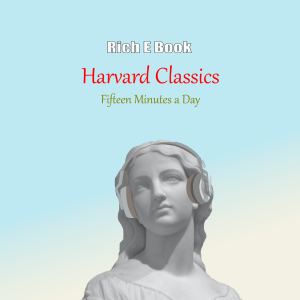
281.2K
Downloads
736
Episodes
Former President of Harvard University Charles W. Eliot wrote in his introduction to the Harvard Classics, "In my opinion, a five-foot shelf would hold books enough to give a liberal education to any one who would read them with devotion, even if he could spare but fifteen minutes a day for reading." Here you are, you can easily listen to his entire 15-minutes-a-day study guide while commuting to and from work (most of us spend far more than 15 minutes a day commuting each day), doing mundane work in the office, washing dishes at home, or doing most of the things day in and day out. It is so easy, so entertaining, and so educational that they can be listened to again and again, until they permeate into our own thinking and into our characters. Perhaps, in one year's time, you will become someone you barely recognize, all for the better. Who knows?
-- Rich E Book
Former President of Harvard University Charles W. Eliot wrote in his introduction to the Harvard Classics, "In my opinion, a five-foot shelf would hold books enough to give a liberal education to any one who would read them with devotion, even if he could spare but fifteen minutes a day for reading." Here you are, you can easily listen to his entire 15-minutes-a-day study guide while commuting to and from work (most of us spend far more than 15 minutes a day commuting each day), doing mundane work in the office, washing dishes at home, or doing most of the things day in and day out. It is so easy, so entertaining, and so educational that they can be listened to again and again, until they permeate into our own thinking and into our characters. Perhaps, in one year's time, you will become someone you barely recognize, all for the better. Who knows?
-- Rich E Book
Episodes

Saturday Jun 04, 2022
Introductory Note: Egmont by Johann Wolfgang von Goethe
Saturday Jun 04, 2022
Saturday Jun 04, 2022
Introductory note on Egmont by Johann Wolfgang von Goethe (Volume 19, Harvard Classics)

Saturday Jun 04, 2022
Egmont (Act I, Scene I), by Johann Wolfgang von Goethe
Saturday Jun 04, 2022
Saturday Jun 04, 2022
Spain sent the Duke of Alva to subdue the Netherlands. In quelling disorder he killed the people's hero, Count Egmont. From this story Goethe made a famous play. (Volume 19, Harvard Classics)
Egmont sentenced to death June 4, 1658.

Friday Jun 03, 2022
Introductory Note: William Harvey
Friday Jun 03, 2022
Friday Jun 03, 2022
Introductory note on William Harvey (Volume 38, Harvard Classics)

Friday Jun 03, 2022
On the Motion of the Heart and Blood in Animals, by William Harvey
Friday Jun 03, 2022
Friday Jun 03, 2022
Galileo, by holding his pulse while watching a swinging cathedral lamp, evolved a theory that made clocks possible. Harvey, by feeling his pulse, educed that arteries carry blood. (Volume 38, Harvard Classics)
Dr. William Harvey died June 3, 1657.

Thursday Jun 02, 2022
Introductory Note: Jean Jacques Rousseau
Thursday Jun 02, 2022
Thursday Jun 02, 2022
Introductory note on Jean Jacques Rousseau (Volume 34, Harvard Classics)

Thursday Jun 02, 2022
Profession of Faith of a Savoyard Vicar, by Jean Jacques Rousseau
Thursday Jun 02, 2022
Thursday Jun 02, 2022
A "Back to Nature" movement in the seventeenth century was headed by Rousseau, who believed that civilization was degrading. To save money for his work, he entrusted each of his children to the tender mercies of a foundling house. (Volume 34, Harvard Classics)
Jean Jacques Rousseau born June 2, 1712.

Wednesday Jun 01, 2022
Introductory Note: Christopher Marlowe
Wednesday Jun 01, 2022
Wednesday Jun 01, 2022
Introductory note on Christopher Marlowe (Volume 19, Harvard Classics)

Wednesday Jun 01, 2022
The Tragical History of Doctor Faustus, by Christopher Marlowe
Wednesday Jun 01, 2022
Wednesday Jun 01, 2022
For the best blank verse in English, read "Dr. Faustus," the masterpiece of Marlowe, who gave Shakespeare lessons in playwriting. This genius knew the secret of gripping drama. (Volume 19, Harvard Classics)
Marlowe died June 1, 1593.

Tuesday May 31, 2022
Introductory Note: Walt Whitman
Tuesday May 31, 2022
Tuesday May 31, 2022
Introductory note on Walt Whitman (the Ridpath Library of Universal Literature)

Tuesday May 31, 2022
Preface to Leaves of Grass, by Walt Whitman
Tuesday May 31, 2022
Tuesday May 31, 2022
Walt Whitman is the most original and startling of modern poets. An irony of his life is that while he wrote for the contemporary masses, only a limited number of followers appreciated his genius, now universally recognized. (Volume 39, Harvard Classics)
Walt Whitman born May 31, 1819.
